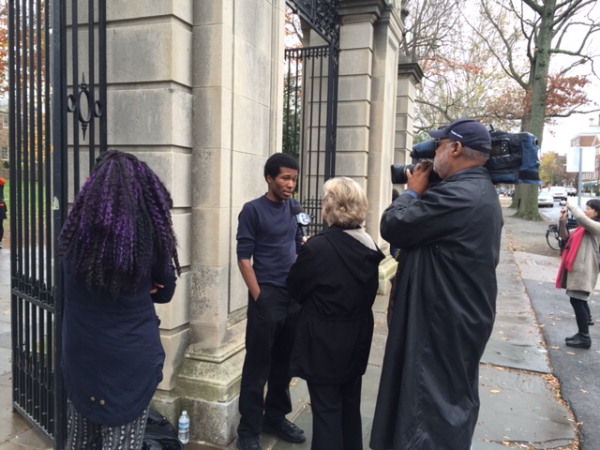By Philip Sean Curran, Staff Writer
Over a span of two days in November, Nassau Hall was taken over by student protesters who helped ignite a debate about the legacy of Woodrow Wilson at Princeton University.
The Black Justice League, declaring the former university and later U.S. president left behind a racist legacy at Princeton, demanded that Mr. Wilson’s name be removed from the university’s public policy school and a dormitory and his portrait be removed from a dining hall.
Students refused to leave Nassau Hall, occupying university President Christopher L. Eisgruber’s office overnight before reaching an agreement with him and other university administrators to leave on Nov.19, 32 hours after protesters first went inside.
In an online petition, the group said it wants to dismantle “the legacy of white supremacy and anti-blackness on campus.”
A few days after the protest ended, Mr. Eisgruber gave his views on what had transpired and where the school goes from here. In particular, he touched on Mr. Wilson, the president of the university from 1902-1910.
“As every Princetonian knows, Wilson left a lasting imprint on this university and this campus, and while much of his record had a very positive impact on the shaping of modern Princeton, his record on race is disturbing,” Mr. Eisgruber wrote in a message sent Nov.22 sent to the school community and alumni.
In December, the school announced that its board of trustees had formed a committee “to consider” Mr. Wilson’s legacy. One of the committee members is the author A. Scott Berg, who wrote a biography about Mr. Wilson.
“The Board of Trustees has authority over how the university recognizes Wilson, and our committee will consider specifically whether or not changes should be made in how the university recognizes his legacy,” said Brent Henry, a trustee and chairman of the Wilson committee, in a university issued news release.
Yet the protesters spawned a reaction from a student group called the Princeton Open Coalition, offering itself as a counter to the Black Justice League. The organization, writing in a letter to Mr. Eisgruber, expressed concerns about tactics the protesters used against fellow students.
“We, the Princeton Open Campus Coalition, refuse to let our peers be intimidated or bullied into silence on these — or any — important matters,” read the group’s letter posted on its Facebook page.
“We oppose efforts to purge (and literally paint over) recognitions of Woodrow Wilson’s achievements, including Wilson College, the Woodrow Wilson School of Public and International Affairs and his mural in Wilcox Dining Hall.”
“To be an inclusive community,” Mr. Eisgruber wrote in his Nov.22 message, “we must treat one another with respect even when we disagree vigorously about topics that matter deeply.”

